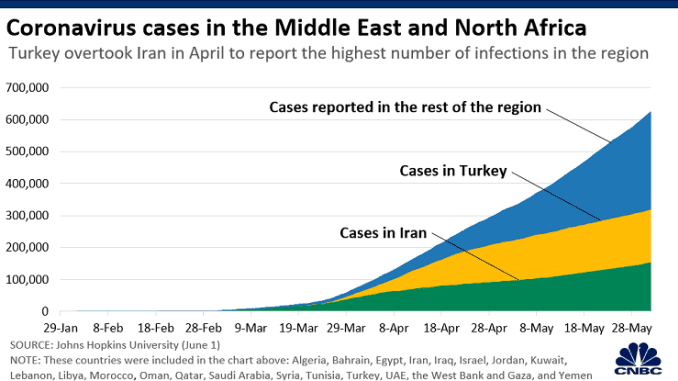Source: CNBC
May 20 2020
By Natasha Turak
- The move amended the original limit of $5 billion on the two countries’ initial swap agreement in 2018, raising it to $15 billion.
- Funding markets have deteriorated in Turkey, with the lira hitting its lowest point ever just this month amid investor concerns over the country’s finances.
- Still, “it’s unclear whether the Turkey-Qatar currency swap deal will have tangible effects on the Turkish economy,” one forecasting expert told CNBC.
Turkey’s central bank tripled its currency swap agreement with Qatar on Wednesday, securing much-needed funding as the country of 82 million burns through its reserves and faces a widening fiscal deficit and potential full-year recession.
The move amended the original limit of $5 billion on the two countries’ initial swap agreement in 2018, raising it to $15 billion.
“The core objectives of the agreement are to facilitate bilateral trade in respective local currencies and to support financial stability of the two countries,” the bank said. The swaps are performed in Turkish lira and Qatari riyal.
A currency swap line is an agreement between two central banks to exchange currencies, set up to improve liquidity conditions and provide foreign currency funding to domestic banks during periods of market stress. Funding markets have deteriorated in Turkey, with the lira hitting its lowest point ever just this month amid investor concerns over the country’s finances.
The Turkish central bank has drawn down millions of dollars from its foreign currency reserves in recent months to buy lira and prop it up against the dollar. The expanded swap line with Qatar — which in recent years has strengthened its political and economic relationship with Ankara — enables Turkey’s central bank to provide its domestic banks with the foreign liquidity they need without using its own foreign reserves.
Turkey’s lira saw a slight rise Tuesday amid talk of currency swap lines from Qatar, the Bank of Japan and the Bank of England, moving from 6.877 to the dollar earlier that day to a close of 6.7806. The dollar edged back up slightly against the Turkish currency Wednesday, buying 6.794 lira at 9 a.m. London time. Swap lines from the Japanese and U.K. central banks have yet to be confirmed.
Turkey-U.S. tensions
Still, “it’s unclear whether the Turkey-Qatar currency swap deal will have tangible effects on the Turkish economy,” says Agathe Demarais, global forecasting director at the Economist Intelligence Unit. “Turkey is desperate for access to U.S. dollar swap lines, which the U.S. Fed continues to hold off on. The swap deal is relevant only for trade with Qatar, which remains limited.”
That kind of support from the U.S. Federal Reserve is highly unlikely, economists say; the Fed remains reluctant to meet Turkey’s request of dollar swap lines because of what is deems the high level of politicization of the Turkish central bank.

U.S. President Donald Trump greets Turkey’s President Tayyip Erdogan during a joint news conference at the White House in Washington, November 13, 2019.
Joshua Roberts | Reuters
Turkey’s central bank is seen in recent years to have increasingly come under President Recep Tayyip Erdogan’s control, putting off investors and undermining confidence in the independence of the country’s monetary authorities. Political tensions between the two NATO allies also remain high in the wake of Turkey’s purchase of the Russian S-400 missile defense system.
“From a geopolitical perspective, the U.S. is staunchly opposed to the conclusion of such deals, which aim at ditching the U.S. dollar,” Demarais remarked, noting a key function of such swap deals, which are often used to circumvent U.S. sanctions and render the dollar irrelevant. “U.S.-Turkey tensions will only rise further, which represents the main threat to the Turkish economy.”
Banking regulator attempting to quash lira speculation
The country’s banking regulator also announced Wednesday the exemption of two banks — Euroclear Bank and Clearstream Banking — from limitations imposed on Turkish banks against transacting with foreign institutions in lira. The regulator’s sweeping restrictions on foreigners trading lira in early May was an attempt to stem short-selling and speculating against the currency, but backfired spectacularly, scaring off investors and sending the lira to record lows.

Of Wednesday’s exemption, Tim Ash, senior emerging markets strategist at Bluebay Asset Management, said: “Positive move. Guess (this) underlines that the Turkish authorities want sticky money still to invest in Turkish markets, but the warnings are clear to ‘speculators’ not to take on the authorities in shorting the lira.”
Turkey is currently home to the highest number of coronavirus cases in the Middle East region at nearly 150,000, having surpassed Iran in mid-April. But its economy was already under pressure before the coronavirus hit.
Now, after nearly two years of a weakening currency, high debt and fast-disappearing foreign reserves, the country is in a particularly bad place to weather a pandemic. Its unemployment rate was already nearly 14% in January, before the economy felt the impact of the coronavirus, and its massive tourism industry is on course to be decimated for the near future.


This summer seems to be decisive for the turkish economy!
ReplyDelete